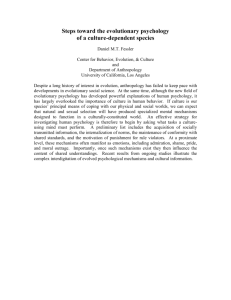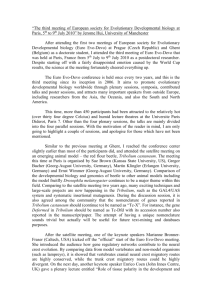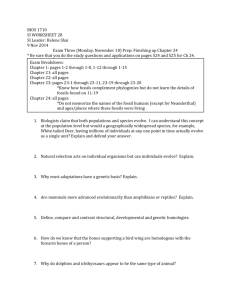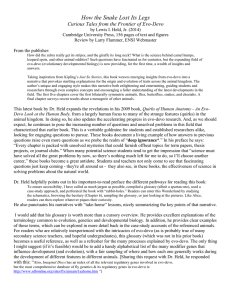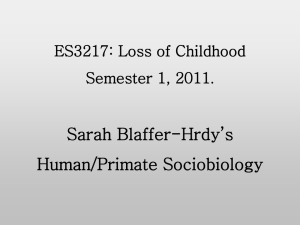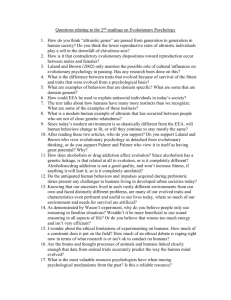FSHD 603: Topics in Social and Emotional Development in Childhood
advertisement
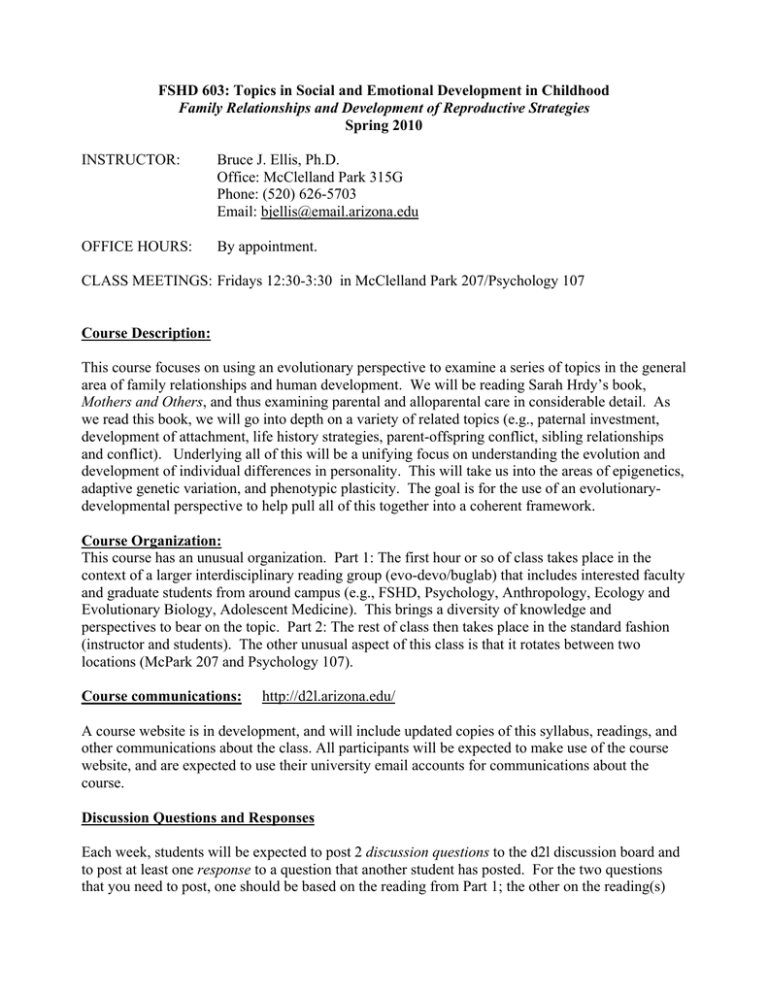
FSHD 603: Topics in Social and Emotional Development in Childhood Family Relationships and Development of Reproductive Strategies Spring 2010 INSTRUCTOR: Bruce J. Ellis, Ph.D. Office: McClelland Park 315G Phone: (520) 626-5703 Email: bjellis@email.arizona.edu OFFICE HOURS: By appointment. CLASS MEETINGS: Fridays 12:30-3:30 in McClelland Park 207/Psychology 107 Course Description: This course focuses on using an evolutionary perspective to examine a series of topics in the general area of family relationships and human development. We will be reading Sarah Hrdy’s book, Mothers and Others, and thus examining parental and alloparental care in considerable detail. As we read this book, we will go into depth on a variety of related topics (e.g., paternal investment, development of attachment, life history strategies, parent-offspring conflict, sibling relationships and conflict). Underlying all of this will be a unifying focus on understanding the evolution and development of individual differences in personality. This will take us into the areas of epigenetics, adaptive genetic variation, and phenotypic plasticity. The goal is for the use of an evolutionarydevelopmental perspective to help pull all of this together into a coherent framework. Course Organization: This course has an unusual organization. Part 1: The first hour or so of class takes place in the context of a larger interdisciplinary reading group (evo-devo/buglab) that includes interested faculty and graduate students from around campus (e.g., FSHD, Psychology, Anthropology, Ecology and Evolutionary Biology, Adolescent Medicine). This brings a diversity of knowledge and perspectives to bear on the topic. Part 2: The rest of class then takes place in the standard fashion (instructor and students). The other unusual aspect of this class is that it rotates between two locations (McPark 207 and Psychology 107). Course communications: http://d2l.arizona.edu/ A course website is in development, and will include updated copies of this syllabus, readings, and other communications about the class. All participants will be expected to make use of the course website, and are expected to use their university email accounts for communications about the course. Discussion Questions and Responses Each week, students will be expected to post 2 discussion questions to the d2l discussion board and to post at least one response to a question that another student has posted. For the two questions that you need to post, one should be based on the reading from Part 1; the other on the reading(s) from Part 2. Your questions should be posted by Wednesday at 5pm and your response should be posted by Thursday at 12pm (noon). Here are some guidelines for your questions: Each discussion question should be 150-250 words. • The discussion questions should do more than just request information or clarification. That is, the questions should raise issues, explore implications, challenge assumptions, or juxtapose ideas. • The discussion questions should be tied to the particular readings for that week. Do not ask general questions that could have been posed without ever having done the readings . • You are welcome to pick a fight (i.e., write a critical question). • You are welcome to try to answer your own questions. • You are welcome to try to connect your questions to your own research or research interests. • You are welcome to try to place your questions in the context of other literature. Your response should seriously engage the question. Discussion Leadership: Each student will help lead one day of class discussion. The job of the discussion leader that day will be to carefully review all of the student discussion questions, organize them in some coherent way (in a document that you will hand in to me at the end of class), and then work with me ensure that the major themes and issues raised in the discussion questions get engaged during class. Class Participation and Attendance This class is based on a seminar-discussion format. My desire for this course is to provide an environment in which all students feel free and safe to thoughtfully add to the class discussion in their own way. It is my goal that we will listen to and build upon each other's thoughts and ideas as we work together to learn more about evolutionary-development approaches to families and development. You should bring talking points with you to class every week. Don’t let 3 hours go by without participating! Class preparation is critical. Attendance is mandatory. Readings Required text: Hrdy, S.B. (2009). Mothers and Others: The Evolutionary Origins of Mutual Understanding. Cambridge, MA: Harvard University Press. In addition, a set of course readings consisting of journal articles and book chapters will be available on d2l. The specific readings for each week are listed below. Research Proposal Each student will be required to write a research proposal on some topic related to the course. A draft of the proposal will be due April 5th, and the final paper will be due not later than May 5th. I will be happy to meet with students individually to discuss ideas for their proposals. In addition, you are required to email me (maximum one page) by March 24th stating your idea for your research proposal. I will provide you with feedback on your initial idea and feedback on your draft. During the last two weeks of the course, each student will present his or her proposal to the class. (More detailed guidelines and suggestions will be posted to the d2l site.) Grades In determining the final letter grade for the course: Discussion questions and responses: 30% (Did you get them done on time? Did they meet the expectations stated above?) Discussion leadership and class participation: 20% (Did you come to class well-prepared and actively participate? Were you here every week?) Research proposal: 50% (Did you get all of the pieces done on time? Were you responsive to Feedback? Did you have a well-organized and effective classroom presentation? Quality of the final product?) Date Jan. 15 READINGS Hrdy Chap 1 (Evo-devo) TOPIC Cooperation and Sharing Jan. 15 ---------------------------------------------- Introduction and Overview Jan. 22 Hrdy Chap 2 Evolution of Intersubjectivity (Evo-devo) Jan. 22 Bjorklund, D.F., Ellis, B.J., & Rosenberg, J.S. (2007). Evolutionary Evolved probabilistic cognitive mechanisms: An Developmental evolutionary approach to gene x environment x development Psychology interactions. Advances in Child Development and Behavior, 35, 1-36. (Class) Jan. 29 Hrdy Chap 3 Jan. 29 (Evo-devo) Review the many different ways that infant primates are cared Target article only: Del Giudice, M. (2009). Sex, attachment, and the development of reproductive strategies. Behavioral and Brain Sciences, 32, 1-67. Sex, attachment, and the development of reproductive strategies LOCATION McClelland Park Rm. 207 Psychology 107 McClelland Rm. 207 (Class) Feb. 5 Hrdy Chap 4 (Evo-devo) Contrast infant care among wild Great Apes with that of nomadic hunter-gatherers Feb. 5 Ellis, B.J., Figueredo, A.J., Brumbach, B.H., & Schlomer, G.L. (2009). Fundamental dimensions of environmental risk: The impact of harsh versus unpredictable environments on the evolution and development of life history strategies. Human Nature, 20, 204-268. (Class) Life history strategies Feb. 12 Hrdy Chap 5 Who are alloparents and why did they help? (Evo-devo) Feb. 12 Geary, D. C. (2007). Evolution of fatherhood. In C. Salmon & T. Shackelford (Eds.), Family relationships: An evolutionary perspective (pp. 115-144). New York: Oxford University Press. Psychology 107 McClelland Rm. 207 Paternal Investment Nettle, D. (2008). Why do some dads get more involved than others? Evidence from a large British cohort. Evolution and Human Behavior, 29, 416–423. (Class) Feb. 19 Hrdy Chap 6 (Evo-devo) Feb. 19 Harris, J. R. (2005). Social behavior and personality development: The role of experiences with siblings and with peers (pp. 245-270). In B. J. Ellis & D. F. Bjorklund (Eds.), Alloparenting in taxonomically diverse species Sibling relationships/ birth order Psychology 107 Origins of the Social Mind. New York: Guilford Press. Frank J. Sulloway, F.J. (2007). Birth Order. In C. Salmon & T. Shackelford (Eds.), Family relationships: An evolutionary perspective (pp. 162-182). New York: Oxford University Press. (Class) Feb. 26 Hrdy Chap 7 Babies as sensory traps (Evo-devo) Feb. 26 Schlomer, G.L., Del Giudice, M. DeBaca, T. & Ellis, B.J. (submitted). The Utility of Parent-Offspring Conflict Theory in Understanding Parent-Child Conflict. McClelland Rm. 207 Parent-offspring conflict (Class) Mar. 5 Hrdy Chap 8 Grandmothers (Evo-devo) Mar. 5 Flinn MV, Quinlan RL, Ward CV, & Coe MK (2007). Evolution of the human family: Cooperative males, long social childhoods, smart mothers, and extended kin networks. In C. Salmon & T. Shackelford (Eds.), Family relationships: An evolutionary perspective (pp. 16-38). New York: Oxford University Press. Quinlan, R.J., & Quinlan, M.B. (2008). Human lactation, pair-bonds, and alloparents: A Cross-cultural analysis. Human Nature, 19, 87–102. (Class) Mar 12 SRA: No Class Mar. 19 Spring Break Mar. 24 Email me (maximum one page) stating idea for research proposal. Evolution of the human family and pair-bonding Psychology 107 Mar. 26 Hrdy Chap 9 Mar. 26 Isles, A.R., & Wilkinson, L.S. (2008). Epigenetics: what is it and why is it important to mental disease? British Medical Bulletin, 85, 35– 45. (Evo-devo) Long childhoods and other life history traits associated with cooperative breeding Psychology 107 Epigenetics Champagne, F.A., & Mashoodh, R. (2009). Genes in Context: Gene–Environment Interplay and the Origins of Individual Differences in Behavior. Current Directions in Psychological Science, 18, 127-131. Cole, S.W. (2009). Social Regulation of Human Gene Expression. Current Directions in Psychological Science, 18, 132-137. (Class) April 2 Target article only: Keller, M. C., & Miller, G. F. (2006). Resolving the paradox of common, harmful, heritable mental disorders: Which evolutionary genetic models work best? Behavioral and Brain Sciences, 29, 385-452. Adaptive genetic variation McClelland Park Rm. 207 (Evo-devo) April 2 Target article only: Penke, L., Denissen, J. J. A., Adaptive genetic & Miller, G. F. (2007). The evolutionary genetics variation of personality. European Journal of Personality, 21, 549-587. (Class) April 5 Preliminary research proposals due (5pm). Turned in to my office. April 9 PP. 129-163 (Chapter titled: Why grow up?) of: Ellison, P. T. (2001). On fertile ground: A natural history of human reproduction. Cambridge, MA: Harvard University Press. Pubertal Development (Evo-devo) April 9 Ellis, B.J. (2004). Timing of pubertal maturation in girls: An integrated life history approach. Psychological Bulletin, 130, 920-958. (Class) Pubertal Development Psychology 107 April 16 Ellis, B.J., Boyce, W.T., Belsky, J., BakermansKranenburg, M.J., & van IJzendoorn, M.H. (under review). The differential susceptibility paradigm: Reconceptualizing person-xenvironment interactions in development. Submitted to Development and Psychopathology. Evolutionary McClelland models of person-x- Park Rm. environment 207 interactions in development (Evo-devo) April 16 Ellis, B.J. (in press). Toward an evolutionarydevelopmental explanation of alternative reproductive strategies: The central role of switch-controlled modular systems. In D.M. Buss & P.H. Hawley (Eds.), The evolution of personality and individual differences. New York: Oxford University Press. Evolutionary models of person-xenvironment interactions in development (Class) April 23 Student presentations McClelland Park Rm. 207 April 30 Student presentations McClelland Park Rm. 207 May 5 Final Research Proposals due (5pm). Turned in to my office.
